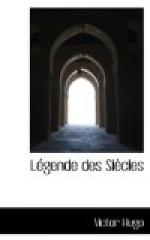Macchabee. Judas Maccabaeus, the Jewish hero, who freed his country from the tyranny of Antiochus Epiphanes.
Amadis See note on EVIRADNUS.
Aetius, a Roman general who lived in the fifth century A.D. One of the last heroes and defenders of ancient Rome, he fought Franks, Burgundians, Huns, and succeeded in uniting the German kings of Gaul against Attila, and inflicting a crushing defeat upon him (A. D. 451).
latobrige. The Latobriges were an ancient German tribe who lived in what is now Wurtemberg and Baden.
Platon: the Athenian philosopher Plato, justly placed amongst the poets.
Plaute: Plautus, the Roman writer of comedies, who lived in the second century B.C.
Scaeva Memor, a Roman poet and tragedian of the first century A.D., rescued from oblivion by this line. The three make a bizarre trio; see note on BOOZ ENDORMI.
Sicambre. The Sicambres were the German tribe who in Roman times lived on the Rhine.
incruste d’erable, i. e. inlaid with maple.
bailli, i. e. governor.
reitre, an old word, derived from the German Reiter, used of the German knights.
buccin, properly a whelk, is a name given to a musical instrument very similar to a trombone.
brassiere, a little jacket or vest worn close round the body. The word is usually used in the plural. Likely enough Hugo intends simply the corset.
au penchant des mers, i. e. where the land slopes to the sea. A peculiar expression; au penchant de la terre would be more usual.
les chouettes felines. The epithet refers to their nocturnal habits.
L. 353. The antecedent of que is vautours. The reference is to gladiatorial combats in the Roman Circus, and the louve d’airain is the famous bronze wolf of the Capitol, a statue representing a wolf suckling two children.
fauve, here `savage’. See note on EVIRADNUS.
cru, i. e. unashamed.
faite vermeil. See note on AYMERILLOT, where the same phrase occurs.
L. 391. figurant, ‘suggesting the form of’. A highly characteritic touch. Hugo possessed a faculty of poetic vision which changed the shapes of things so as to bring them into harmony with the dominant ideas of the moment. Cf. LA ROSE DE L’INFANTE, and LA CONFIANCE.
Heliogabales. Heliogabalus was a Roman Emperor (r. 217-222) noted for his sensuality and his caprices.
cistre, cittern or cithern, a musical instrument resembling the guitar.
un Louvre: the Louvre is the well-known palace in Paris where many kings of France resided. Note the antithesis in the same line, antre de rois, Louvre de voleurs.
les ors, various kinds of gold. Sixte Malaspina, introduced as one of the counsellors of Ratbert in a poem entitled ‘Ratbert’ not given here.




